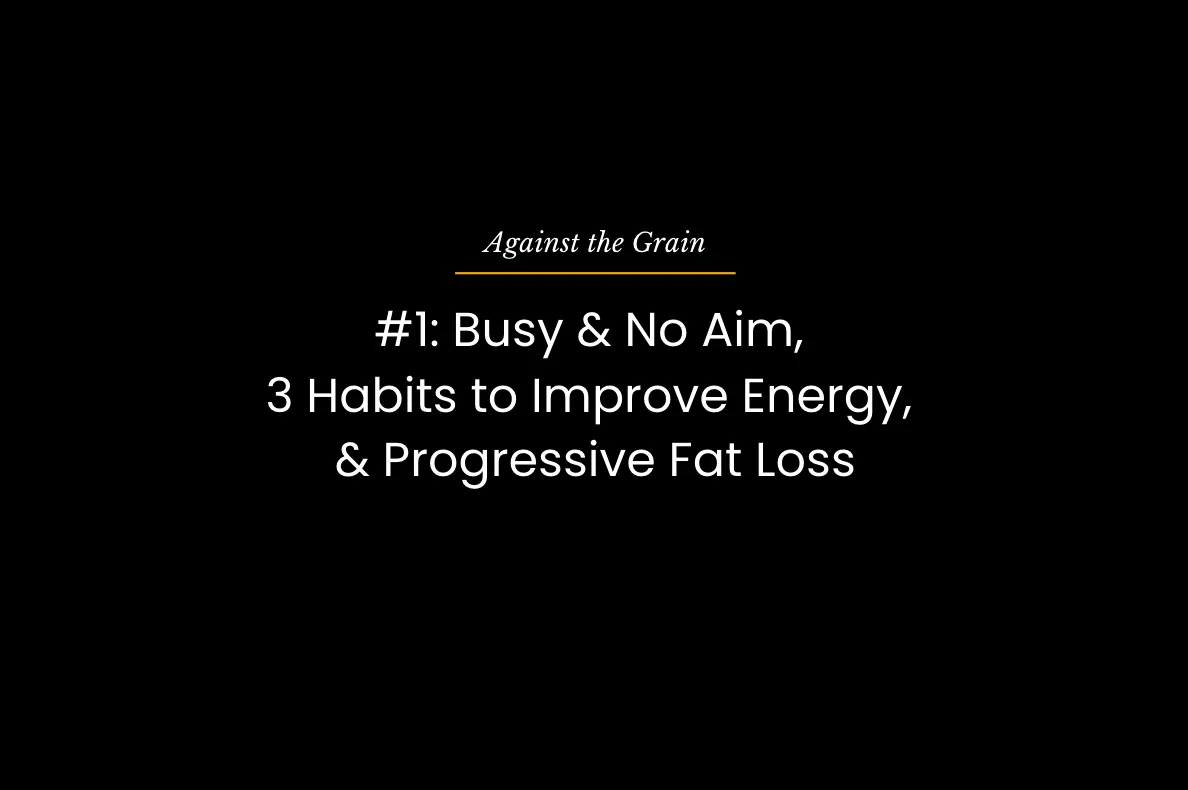Against the Grain...
Published Newsletters
Discover Tools, Methods, & Frameworks To Live A Life of Design
Discover Tools, Methods, & Frameworks
To Live A Life of Design

#1: Being Busy & No Aim, Morning Habits To Improve Energy, & Progressive Fat Loss.
Insights:
Busy & No Aim
Being busy without an aim or purpose is not a badge of honor.
It’s a sign of a weak mind, and lack of direction.
I think as a society we have primed ourselves with wanting to do more, but accomplish less.
We pride ourselves in being “busy”. When in reality being busy without purpose, shows a lack of organization, lack of prioritization, and lack of having the ability to say no.
I used to be someone who was busy all the time to escape the internal noise & not knowing what to prioritize.
There is peace that comes with not over committing to pointless things.
People say, “I have no choice.” I say we all have a choice. The choices you chose to commit to, made you busy. It’s up to you now to unchoose those things, because you have full control over your life.
Here’s what it comes down to:
Knowing what is important and what is not.
Having the ability to say “No” (aka getting Vitamin N)
Ruthlessly eliminating people & activities.
When you start to eliminate things from your life that are not important, it’s a kind of freedom.
It lets you focus on the things that actually matter.
Morning Habits To Improve Energy Levels
Having the energy to keep up with the demands of life is extremely important.
Whether you’re a parent, a teenager, or approaching old age, you need energy.
Over the last 4 years, I’ve worked 13-15 hours a day 6 days a week .
To do this consistently requires energy, and do all this with just 1 cup of coffee (120 mg caffeine) & many times no coffee.
There are 3 main habits I have in the morning that help me have energy throughout the day.
1. Wait to have caffeine 90 minutes after waking up
Before, out of habit, I used to drink caffeinated coffee as soon as I got out of bed.
When we wake up our bodies release cortisol to help us wake up. Caffeine blocks adenosine receptors, which promote sleep and relaxation.
But when cortisol levels are high the effects of caffeine are not as helpful. This is part of the reason why you’ll need more caffeine to wake up.
By waiting 90 minutes after waking up, cortisol is declining, so you can have caffeine and feel better effects of it.
I will have decaf coffee when I wake up because I like the feeling of drinking coffee in the morning and then have caffeinated coffee usually 3 hours after waking up.
2. Consuming High Protein for Breakfast
The SAD (standard american diet) typically includes a high processed sugar and refined carbs i.e. pancakes, waffles, crepes.
Too many simple carbohydrates will spike your blood sugar, and then it will come crashing down which leads to people getting tired.
That leads to more caffeine intake, and it’s a spiral of death.
What works for me is, I have 50-60 grams of protein for breakfast and only 30 carbs. This helps me prevent riding the blood sugar roller coaster, and helps me sustain my energy.
3. Getting Sunlight After Waking Time
Our internal body clock is called the circadian rhythm, it is extremely vital.
Getting sunlight in the morning helps reset our circadian rhythm, regulates your sleep cycles, enhances your mood, helps you get Vitamin D, & helps you become more alert.
I wake up at 5:30am, the sun is not out then, so I will turn on white lights to help me feel alert and when the sun comes up I will go for a short walk.
These methods are great, but there is no cure for a good night's sleep.
One of these days I’ll write about sleep and how to improve sleep quality.
Progressive Fat Loss
My wife and I at the end of 2023 started to go on a diet.
And by diet I mean caloric restriction, all diets accomplish caloric restriction.
My goal is to go from 16% body fat to 11%. This means I have to lose about 11lbs.
After 4 weeks of being in deficit, the demands of being in a deficit caught up to both of us. We decided to end the diet and instead follow a framework called Progressive Fat Loss.
If you’ve been in a deficit and you’re already pretty lean it is not fun. Plus if you’re going into a stressful season with work or with life, personally being in a deficit is not recommended.
Reason being that it is a sure way to go limbic where you’re reactive, you can’t stay grounded, and it’s hard to focus.
It’s important when you’re dieting to look at the demands of life, if you’re going into a stressful period in your life for a few months, I recommend staying at maintenance. When things slow down then focus on dieting. [1]
The traditional way I will have clients drop weight is to first put them on maintenance for 8 to 12 weeks, then put them in a caloric deficit of 500 calories for 12 weeks. After 12 weeks go back into maintenance and then do it again.
For those that are only 10-15 lbs away from their goal you’ll know that it’s harder to lose body fat especially because your body has a natural body fat set point where it likes to retain a certain % of body fat.
If you’re struggling with the last 10-15lbs of body fat, and you track your caloric intake [2], then you might want to try Progressive Fat Loss.
Here is how it works:
Start by being on maintenance calories for 4 to 6 weeks.
Then drop your calories and go into an aggressive dieting phase for 1 to 3 weeks. Aggressive meaning cutting calories by 500 to 800. [3]
Then returning back to maintenance for another 4 to 6 weeks. Repeat the cycle until desired results are achieved.
This is a better way to get rid of unwanted body fat in a way that you can adhere to.
Greatest thing about this is you can stay in maintenance longer if needed and when the demands of life slows down, go into a diet phase again.
This is what I am planning on doing for the next couple months to get to my body fat goal, along with increasing my activity levels.
If you have any specific questions about this hit ‘reply’ and let me know.
[1] In this instance when I talk about dieting I am referring to people who are already pretty lean, if you’ve got significant weight to lose I suggest getting into a deficit right away because that will impact your health.
[2] Make sure you’re tracking your calories when you do this. Don’t go into this blind. If you do this will not work. It’s important to use data to make adjustments to your body. If you’re one of those intuitive eaters, and can magically calculate your calories then go for it but for the normal folks track your food to know where you’re at.
[3] Being in a deficit is relative to every individual. If you’re going to cut calories make sure it’s not too low where you cannot get ample amounts of protein. Our goals is to lose weight without sacrificing lean tissue or muscle mass.
Quote:
Here's a quote that resonated with me this week a lot since I am trying to build a new habit.
“The chains of habit are too weak to be felt until they are too strong to be broken.”
Question:
If you want to dig a hole, you can’t look at it, speak to it, sing to it, or dance around it.
The holes need to be dug.
Same thing in life, when things need to get done, double down and get it done.
Here is a question to think about this week:
What’s the one thing you’ve been dancing around doing instead of doing it?
And doing that one thing will make you feel accomplished?
If you found this newsletter valuable, feel free to share it using this link: https://mohammedmalik.com/newsletters/b/atg1
Till next time,

- M. Malik
